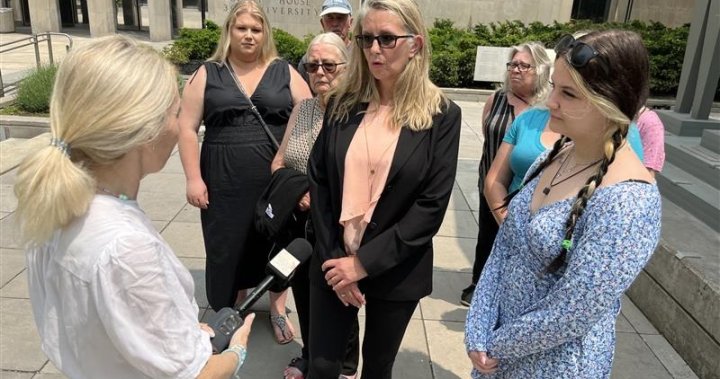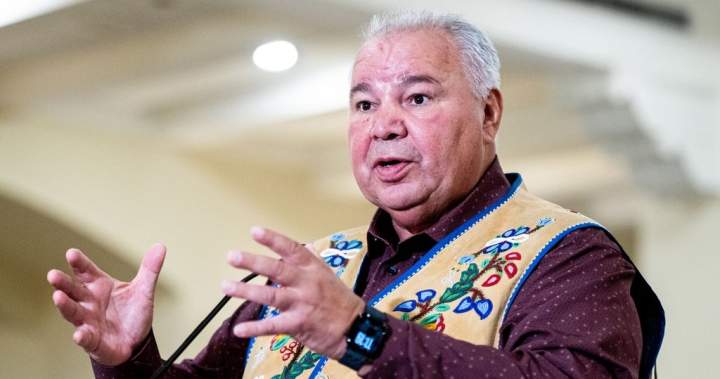Uncategorized
Toronto man who deliberately shot an unarmed stranger given life sentence – Toronto

A Toronto man who shot and killed an unarmed stranger has been sentenced to life in prison with no chance of parole for 18 years.
Superior Court Justice Maureen Forestell called the murder of John Wheeler “profoundly serious” give it was the result of the fact that 18-year-old Christopher Mitchell wanted to avoid potentially being apprehended by police for a break-and-enter.
Last October, Mitchell pleaded guilty to second-degree murder admitting that on Aug. 12, 2020, he shot and killed Wheeler with a shotgun outside the apartment building at 1350 Danforth Rd. where Wheeler lived.
Mitchell and another person attended the apartment complex with the intention of breaking into a convenience store. They were in an alcove near the store when Wheeler emerged from the lobby of the apartment building to make his way to work.
Wheeler glanced in the direction of the alcove and looked at his phone before moving to the driveway to wait for his ride to work. Mr. Mitchell believed that Mr. Wheeler was contacting the police. Mr. Mitchell removed a shotgun from the duffel bag he was carrying. He crept up behind Mr. Wheeler and shot him in the back.
Wheeler, a 45-year-old man who delivered drywall for a living, had texted his friend to tell him he was outside and ready to be picked up.
In victim impact statements delivered in court Monday, Wheeler, who was 45 and the youngest of 12 children, was described as a kind, funny, hardworking and generous man.
Reading from her reasons for sentence, Forestell said, “The loss of a loved one is always difficult but when that loss is the result of senseless violence it is even more painful. In addition to the impact on the family and friends of Mr. Wheeler, crimes like this one impact the entire community. A good, hardworking man waiting to go to work was shot and killed in a targeted manner.

Get daily National news
Get the day’s top news, political, economic, and current affairs headlines, delivered to your inbox once a day.
“This type of offence undermines our collective sense of safety and security in our community.”
A psychological report prepared by Dr. Giorgio Ilacqua found that Mitchell, the eldest of four siblings, suffered significant physical abuse as a child. As a result, he was placed in group home and foster care by age 15 because of the physical abuse.
Court heard that Mitchell was raised by his mother because his father was in the criminal justice system and has had no contact with his father for the last five years. He also also been diagnosed with mental illnesses and a substance abuse disorder.
“At around 12 years of age, Mr. Mitchell began to hear voices. He was assessed at one point at the Centre for Addiction and Mental Health and was diagnosed with post-traumatic stress disorder, depression and anxiety. However, he did not receive any treatment or medication for these conditions until after his arrest on the charge before me. He is presently taking antipsychotic medication and antidepressants,” Forestell said.
Court heard Mitchell has also abused substances since age 11. Mr. Mitchell admitted Ilacqua that he became involved in criminal activity in his teens and that this included selling drugs.
Mr. Mitchell left school after Grade 10.
While attending school he was frequently suspended, including for fighting, stabbing and guns. Since his incarceration, Mr. Mitchell has completed high school and has begun college-level courses. While in custody, Mr. Mitchell has also pursued Bible study.
Ilacqua administered a series of psychological tests. He diagnosed Mitchell with post-traumatic stress Disorder with psychotic features, depression, anxiety and substance use disorder. He relates these conditions to Mr. Mitchell’s dysfunctional childhood and the abuse that he experienced.
The risk assessment conducted by Ilacqua places Mr. Mitchell at high risk for future involvement in the justice system but Ilacqua opines that appropriate monitoring, structure and intervention could likely decrease the risk.
During an interview with Global News outside the courthouse, Wheeler’s niece said the family was anxious for the sentencing to be finished after nearly five years. Arlene Stuckless said she was angry for years and has been through an emotional rollercoaster.
“There are a lot of people who could be watching this right now, going, ‘Oh, this poor family, it’s not going to happen to us’ but you don’t know honestly,” said Stuckless.
Stuckless said she is hopeful that Mitchell can be rehabilitated and wants to see more social services for young men like Mitchell who come from broken homes.
“They’re only outlet is to be running on the streets and then they get hooked up with the wrong people, they get their hands on that gun and they think they’re big tough guys and they’re not,” said Stuckless.
Wheeler’s niece said the family believes a life sentence with a parole ineligibility period of 18 years is a sentence that should give Mitchell time to work on himself.
“For him to be incarcerated that long — hopefully, he doesn’t get involved with the wrong people and go to the wrong path and he takes the time he’s given and he does something good with his life and then when he does getting out of jail, he can help other young, maybe,” Stuckless added.
© 2025 Global News, a division of Corus Entertainment Inc.
Uncategorized
Motorcycle driver found dead northeast of Tweed after crash: OPP

Ontario Provincial Police say a motorcyclist is dead after a crash northeast of Tweed.
OPP say they were contacted shortly after 4 p.m. Sunday about a deceased male and his motorcycle in the ditch along Flinton Road.

Get breaking National news
For news impacting Canada and around the world, sign up for breaking news alerts delivered directly to you when they happen.
Police say the investigation is in its early stages and that OPP Collision Reconstructionist and Forensic Identification Services are assisting.
The identity of the deceased is not being confirmed at this time.
They say Flinton Road is closed between Robinson Road North and Elzevir Road.
Anyone with more information is asked to contact police.
© 2025 The Canadian Press
Uncategorized
Ford government fails to hit housing target, even after adding LTC beds, student dorms

Despite adding long-term care beds, retirement homes and student dormitories to its housing statistics, the Ford government fell tens of thousands of units short of its goal last year.
New data released by the province this month confirms that even with its modified definitions of new housing, Ontario achieved less than 80 per cent of its self-imposed 125,000-unit target for 2024.
The figure was introduced by the Ford government after it won the 2022 election, partly with a promise to build 1.5 million new homes over 10 years to 2031.
As part of the push, the government assigned housing targets to major municipalities, offering financial incentives to towns and cities that hit their targets.
The new data shows just 15 achieved their targets in 2024, while another eight managed 80 per cent or above, which the province also rewards municipalities for.
Another 27 — including major cities like Ottawa, Mississauga and Brampton — all failed to meet their targets.
“These are bad news numbers and they show what an utter failure the Ford government’s housing policy has been,” Green Party Leader Mike Schreiner said.
“I certainly understand why they want to delay releasing the bad news, and I also understand why they’re trying to fudge the numbers by including forms of housing that were never part of the intent of the original 1.5 million target.”
A spokesperson for the Ministry of Municipal Affairs and Housing said the government was offering funds to help cities build new housing.
“With over $3 billion in housing and community-enabling infrastructure investments and $1.2 billion committed through the Building Faster Fund, we remained focused on delivering the homes Ontario families need,” they wrote in a statement.
Lower housing starts and increasing targets
Ontario’s cratering housing starts come as its targets ramp up.
As it looked to fulfil its promise of 1.5 million homes in a decade, Ontario introduced the Building Faster Fund, a pot of money designed to reward cities which meet their housing goals.

Get breaking National news
For news impacting Canada and around the world, sign up for breaking news alerts delivered directly to you when they happen.
The fund came with individual targets for municipalities, as well as for the province overall.
The annual goal for the province itself was staggered, beginning at 110,000 for 2023 and climbing every year. The goal for 2024 was 125,000, it is 150,000 this year and will increase to 175,000 per year for 2026 onwards.
In 2023, once it included long-term care beds and other dwellings in its statistics, Ontario exceeded its 110,000 by just under 600 new units.
The province managed just under 95,000 of its 125,000 target in 2024 — or 73,462 if long-term care beds, student housing and other extra categories were excluded.
A little over 20 per cent of housing starts in Ontario last year were actually long-term care, student dorms or other alternative categories not recognized by federal counts.
The added housing starts in 2024 were:
- 14,381 additional residential units, like basements or laneway houses
- 2,807 post-secondary student beds
- 2,278 long-term care beds
- 1,825 suites in retirement homes
The latest data was the first time Ontario has included retirement homes and student residences in its statistics. Long-term care beds were first added in 2023.
The government did not address a question asking if it planned to add even more categories to its definition of a new home.
Meanwhile, the number of municipalities hitting their goals also dropped significantly.
In 2023, there were 20 municipalities which exceeded their target and 12 which managed more than 80 per cent. Those fell to 15 exceeded and eight above 80 per cent through the latest funding.
Ontario Liberal MPP Adil Shamji said the failure of the majority of municipalities to hit their targets is an indictment of provincial — not local — policy.
“It’s like in a school classroom — if one student fails, maybe it’s the student’s fault,” he said. “When the whole class is failing, you’ve got to wonder what the teacher’s not doing right.”
The Ministry of Municipal Affairs and Housing pointed to its latest legislation as a cause for optimism that housing starts may improve.
“Through our legislation, the Protect Ontario by Building Faster and Smarter Act, we are getting more shovels in the ground by streamlining development processes, lowering costs, and reducing delays,” the spokesperson said in a statement.
While Ontario’s total housing starts have been available from federal sources since early this year, Ontario has spent months tabulating the figures and only released them in early August.
The government said it took time to update the data, which was further delayed by the snap election call in February.
Shamji, however, said he assumed the government was deliberately dragging its feet.
“No doubt this government is ashamed to have to publicly release this information because these are not results to be proud of,” he said.
“Imagine you’re a government that gets to set your own targets, your own definitions, even for what counts as housing, and… and even then you have nothing to show except such dismal results.”
Data from the Canada Mortgage and Housing Corporation shows that over the first six months of 2025, Ontario was on course to do even worse.
Housing starts until June for areas with a population of more than 10,000 people were at around 27,400 — a drop of 25 per cent compared to the same period last year.
Beyond a statement saying Ontario saw 9,125 new rental housing starts between January and June this year, the Ford government has not yet released any data for 2025.
© 2025 Global News, a division of Corus Entertainment Inc.
Uncategorized
Indigenous groups question government funding for Métis Nation of Ontario

First Nations in Ontario and the Manitoba Métis Federation say nearly $1 billion in federal funding went to a group they allege is fraudulently claiming Métis identity.
The Chiefs of Ontario, which represents 133 First Nations in the province, shared with The Canadian Press data on more than 20 years worth of federal funding provided to the Métis Nation of Ontario.
It suggests that $819,836,061 went from Ottawa to the MNO — an organization First Nations leaders say has no legitimacy and threatens their rights.
“This data shows just how badly First Nations in Ontario are being harmed by the diversion of government funding to the MNO and away from the needs of First Nations and other legitimate groups,” the Chiefs of Ontario said in a media statement.
“The question is, why is the Crown sending hundreds of millions of dollars to the MNO when there is overwhelming evidence contradicting their claims?”
The data indicates the money came from several federal departments, including Indigenous Services Canada, Crown-Indigenous Relations, Parks Canada and Environment and Climate Change Canada.
The MNO also received funds from the Canadian Nuclear Safety Commission and the Impact Assessment Agency related to the potential impacts of projects in their communities.
The conflict between First Nations, some Métis groups and the MNO stems from a 2017 decision by the government of Ontario to recognize six “new, historic” Métis communities in the province — and a 2023 federal government bill, which never passed, that would have affirmed the MNO’s right to self-government.
First Nations and other Métis groups say the communities represented by the MNO have no claim to Métis heritage and Ottawa and Ontario have no right to recognize them.

Last month, history professor Leila Inksetter of the University of Quebec in Montreal released a report drafted on behalf of the Wabun Tribal Council that concluded there is no evidence of a mixed-ancestry community in the Wabun Tribal Council’s territory in northeastern Ontario.
The MNO rejected that report, saying that despite years of outside attempts “to discredit” it, “nothing has changed.”

Get breaking National news
For news impacting Canada and around the world, sign up for breaking news alerts delivered directly to you when they happen.
“The facts of history will not change because a new ‘expert’ has been paid to peddle the same Métis denialism,” the group said in a media statement.
The MNO has cited a 2003 decision by the Supreme Court of Canada to recognize a Métis community in and around Sault Ste. Marie, Ont. The case did not consider the six new communities recognized in 2017, but rather what may constitute a Métis right.
Another report, published last month and commissioned by Saugeen Ojibway Nation, also concluded there is no evidence of a distinct Métis community in their territory in southwestern Ontario.
“The historical evidence simply does not support this claim,” says the nearly 200-page report, written by two historians at the University of Toronto.
While the report says there were “certainly individuals and families of mixed ancestry” in the region, that can’t form the basis of a claim to a distinct community within Saugeen Ojibway Nation territory.

Jennifer St. Germain, MNO chief strategy officer, said Métis and First Nations “should not be working at odds as we are not enemies.”
“We have worked together throughout our shared history to push colonial governments to respect the rights of Métis and First Nations peoples, to properly invest in the programs that matter to our families and communities, and to uphold the honour of the Crown,” she said.
“When the MNO and Ontario First Nations work together, we make real change for the better for our children, families, and communities, as well as our lands and waters.
“It’s time to get back to the table rooted in our shared values of honesty, truth, and respect.”
The Chiefs of Ontario says that the academic research “merely reaffirms reality.”
“Not only are Ontario and Canada refusing to consult First Nations, they refuse to share the research they relied on or acknowledge the growing body of research and take steps to fix their mistakes,” the Chiefs of Ontario said in a media statement.
“It is extremely disappointing that Canada and Ontario … failed to do any adequate research before recognizing the MNO.”
Open disputes over claims to Métis heritage came close last year to ripping apart the Métis National Council, which once acted as a national voice for Métis but now has just two provincial members.
The Métis Nation-Saskatchewan withdrew from the Métis National Council last September, citing concerns about the MNO and claiming the council had failed to ensure the integrity of its citizenship registry.

The Métis Nation British Columbia withdrew from the council shortly after, saying it had lost confidence in the council’s ability to serve as a national advocacy organization.
Their departure came years after the Manitoba Métis Federation withdrew from the council, citing similar concerns.
Will Goodon, the Manitoba Métis Federation’s minister of identity protection and inter-Indigenous affairs, said the amount of public money available to Métis communities is limited and should not be shared with bodies that are not connected to what he calls the historic Métis Nation — largely recognized as descendants of the Red River communities in Manitoba.
One Parks Canada grant received by the MNO was meant to allow the organization to secure land and “support creation of an ecological corridor in the region along the north shore of Lake Superior,” says a federal document.
Goodon said that type of funding raises red flags for both Red River Métis and First Nations concerned about the prospect of the MNO seeking land in their territories.

The Manitoba Métis Federation said it’s also troubled by the fact that the federal government last week invited MNO leaders to a meeting to discuss its controversial major projects legislation.
The federation, which boycotted that meeting, said the MNO’s invitation undermined the integrity of the gathering and put the government’s major projects agenda at risk.
“Canada and Ontario are pushing pro-development agendas. They say they will consult with ‘Indigenous communities’ but, in Ontario, the only consultations that should occur are with the rights holders — First Nations,” the Chiefs of Ontario said in a media statement.
“Pan-Indigenous approaches do not work and only devalue the true rights holders.”
© 2025 The Canadian Press
-

 Uncategorized2 months ago
Uncategorized2 months agoAccording to Dior Couture, this taboo fashion accessory is back
-

 Uncategorized2 months ago
Uncategorized2 months agoThese ’90s fashion trends are making a comeback in 2017
-

 Uncategorized2 months ago
Uncategorized2 months agoThe old and New Edition cast comes together to perform
-

 Uncategorized2 months ago
Uncategorized2 months agoUber and Lyft are finally available in all of New York State
-

 Uncategorized2 months ago
Uncategorized2 months agoNew Season 8 Walking Dead trailer flashes forward in time
-

 Uncategorized2 months ago
Uncategorized2 months agoMeet Superman’s grandfather in new trailer for Krypton
-

 Uncategorized2 months ago
Uncategorized2 months ago6 Stunning new co-working spaces around the globe
-

 Uncategorized2 months ago
Uncategorized2 months agoThe final 6 ‘Game of Thrones’ episodes might feel like a full season






